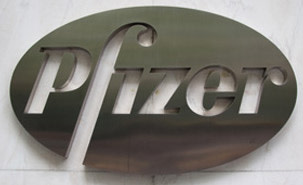Pfizer’s comfortably beaten both top and bottom line estimates in the first quarter.
Revenues fell by 19% to $14.9bn, driven largely by a decline in sales for COVID-19 medicines. Excluding these products sales were up by 11%. Oncology was the standout division up 19%, although this was flattered in part by the recently completed Seagen acquisition.
Operating profit fell by 45% to $3.4bn largely due mainly to the decline in the top line.
Full year revenue guidance is unchanged at $58.5bn-$61.5bn. Underlying diluted earnings per share guidance has been raised to a range of $2.15-$2.35, an increase of 5% at the mid-point.
The shares were up 1.99% in pre-market trading.
Our view
Pfizer’s modest upgrade to 2024 guidance has given beleaguered investors a little respite. It’s one of the world's largest Pharmaceutical companies. But sharply falling COVID-related sales are making for some tough reading for investors. With ongoing declines in this segment, the group's been looking at ways to refresh the product pipeline.
We're seeing modest growth elsewhere in the business. Including the recent Seagen acquisition, non-COVID sales look set to rise at near double-digit rates, which should be enough to stem the top line decline in 2024.
Another threat is the so-called patent cliff. Between 2025 and 2030, the company is facing the loss of exclusivity over several key products which account for around $17bn of revenue.
Pfizer's banking on its ambitious research program to make a big impact on revenue by the end of the decade. However, we caution that there remain significant hurdles to success, including take up by patients and regulatory approvals. Pfizer's R&D hit rate is higher than most. Still, only about 1 in 5 make it from pre-clinical research all the way through to regulatory approval. And whilst Pfizer's program of product launches is broadly on track, there have been a few delays along the way.
Another risk is legislative action on drug pricing, which remains firmly under the microscope of US politicians. In particular, one of Pfizer's best sellers, the blood thinner Eliquis, is one of the first drugs to be subject to price negotiations with the US Department of Health following new legislation.
The acquisition of Seagen saw net debt skyrocket to around $59bn last year. At about 3x forecasted underlying cash profit, it’s not too terrifying, but if there are any negative earnings surprises, the 6.7% prospective dividend yield could come under pressure. Of course, no payout are assured.
In the short term, the deal won't be earnings enhancing. But it doubles the size of the development pipeline in cancer, with the focus shifting to novel medicines with the potential to replace chemotherapy in some tumour types. Pfizer thinks it can more than quadruple Seagen’s revenues to over $10bn by 2030, but that's not without the usual risks of drug development. It will be a while yet before we find out if the hefty premium paid has been worth it.
Pfizer's got a strong record of commercialising blockbuster therapies. And at 10.8 times forward earnings, it's trading at the lower end of its peer group. But there's a sizeable chunk of revenue that needs to be filled as COVID-related sales dwindle and exclusivity on certain products disappears, so investor sentiment is likely to remain subdued until the path to profit growth becomes clearer.
Environmental, social and governance (ESG) risk
The pharmaceuticals sector is relatively high-risk in terms of ESG. Product governance, particularly with safety and marketing, and affordable access to treatment are the key risk drivers. Labour relations, business ethics and bribery and corruption are also contributors to ESG risk.
According to Sustainalytics Pfizer's overall management of material ESG issues is strong. Board-level oversight is in place and there are adequate policies and programmes on bribery, corruption and whistleblowing. Implementation could be an issue, though, given it's being investigated by the SEC and Department of Justice regarding bribery allegations. Pfizer was recognised by the Access to Medicine Index for its value-based healthcare initiatives, but disclosure of list and net price changes in the US has deteriorated over the past few years. The group's transparent with its trial data, but falls short of best practice in other areas of product governance.
Pfizer key facts
All ratios are sourced from Refinitiv, based on previous day’s closing values. Please remember yields are variable and not a reliable indicator of future income. Keep in mind key figures shouldn’t be looked at on their own – it’s important to understand the big picture.
This article is not advice or a recommendation to buy, sell or hold any investment.No view is given on the present or future value or price of any investment, and investors should form their own view on any proposed investment.This article has not been prepared in accordance with legal requirements designed to promote the independence of investment research and is considered a marketing communication.Non - independent research is not subject to FCA rules prohibiting dealing ahead of research, however HL has put controls in place(including dealing restrictions, physical and information barriers) to manage potential conflicts of interest presented by such dealing.Please see our full non - independent research disclosure for more information.


